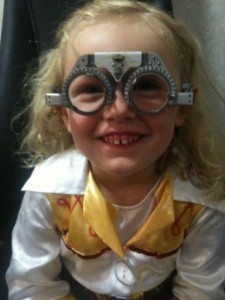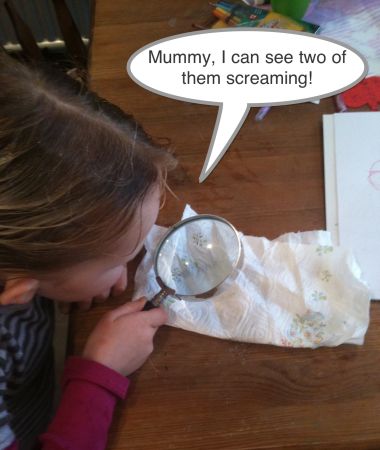 I went to an event a while back; while I was there I lent my Ipad to one of the mum’s daughters to keep her occupied as it’s full to the brim with educational apps. Another mother, who wasn’t meddling or being judgmental, asked me if I worried about the affect it had on children’s eyes. She rattled off some statistic about increase in short sightedness of 11 year olds that for the life of me I can’t remember.
I went to an event a while back; while I was there I lent my Ipad to one of the mum’s daughters to keep her occupied as it’s full to the brim with educational apps. Another mother, who wasn’t meddling or being judgmental, asked me if I worried about the affect it had on children’s eyes. She rattled off some statistic about increase in short sightedness of 11 year olds that for the life of me I can’t remember.
My daughter does use our iphones and ipad so this did worry me a bit, so I popped up to our local opticians (@leightonsopt) to have a chat about it and he kindly put this information together for me. Firstly, he outlines the problem and then gives a few tips on what you can do about it. I thought you may find it useful.
I personally feel the Ipads are an amazing educational tool, I would never suggest not exposing children to them but there are a few things you should consider.
The problem
• The iPad has a shiny, flat screen surface which causes reflections thereby reducing the quality of images being viewed on the screen.
• Due to its weight and lack of fixed position children may find it difficult to hold an iPad for any length of time, increasing the possibility of postural problems.
• Children spending less time playing outside and more time with their nose in front computers & tablets – could be contributing to the increased rates of short-sight.
• An American study has shown that short-sight in the US jumped from just 25% in people ages 12 to 54 in 1971-72 to 41.6% in 1999-2004
• Increased use of computers or tablet PC’s may result in computer vision syndrome.
• Ocular symptoms occur as a result of decreased blinking whilst concentrating on a computer, this results in disruption of the tear makeup causing dry eyes.
• Excessive use of computers in small children may result in a reduction in hand-eye coordination.
What to do
• If you allow your child to use an Ipad it may be an idea to have their eyes tested to identify any underlying issues that may be exacerbated by using one.
• Limit time spent on the iPad. A good rule of thumb for children is to have a 10 minute break for every 30 minutes spent in front of an iPad. During this time their focus should be on varying distances.
• Set a kitchen timer for 25 mins, then a 5 min warning before iPad activity is due to finish. Have another activity ready or in mind for when your child finishes on the iPad.
• Ensure that your child is comfortable at their screen, it May be a good idea to consider a writing slope for the iPad to help with posture. A good rule of thumb is keeping it at an arms distance.
• If you see your child rubbing their eyes, blinking excessively or they complain that their eyes feel sore it is best to have their eyes examined to exclude any ocular problems. As adults we all have days where our eyes feel sore after using computers, please be mindful that children may not necessarily be aware or mention that they have a problem.
• Ensure that your child does not use a computer or iPad in the dark or low light. Local lighting should be at least the same as the background of the screen they are viewing. Also ensure that the brightness of the screen is not too great. If it is too bright for you as an adult, it will also be too bright for your child.
• If you allow your child to use an Ipad it may be an idea to have their eyes tested to identify any underlying issues that may be exacerbated by using one.
• Have your child’s eyes examined regularly. Free NHS eye examinations are available at all Opticians in the UK for children in the age of 16.
• If weather allows, get your child outdoors to balance the time spent indoors.
As this technology is fairly new it will be interesting to see in 10-15 years what impact it is actually having on our children and their eye sight. I’m just glad I now know a few tips for keeping her eyes a bit healthier. Thanks Indie.
What do you think? Do you have other tips you can offer?



